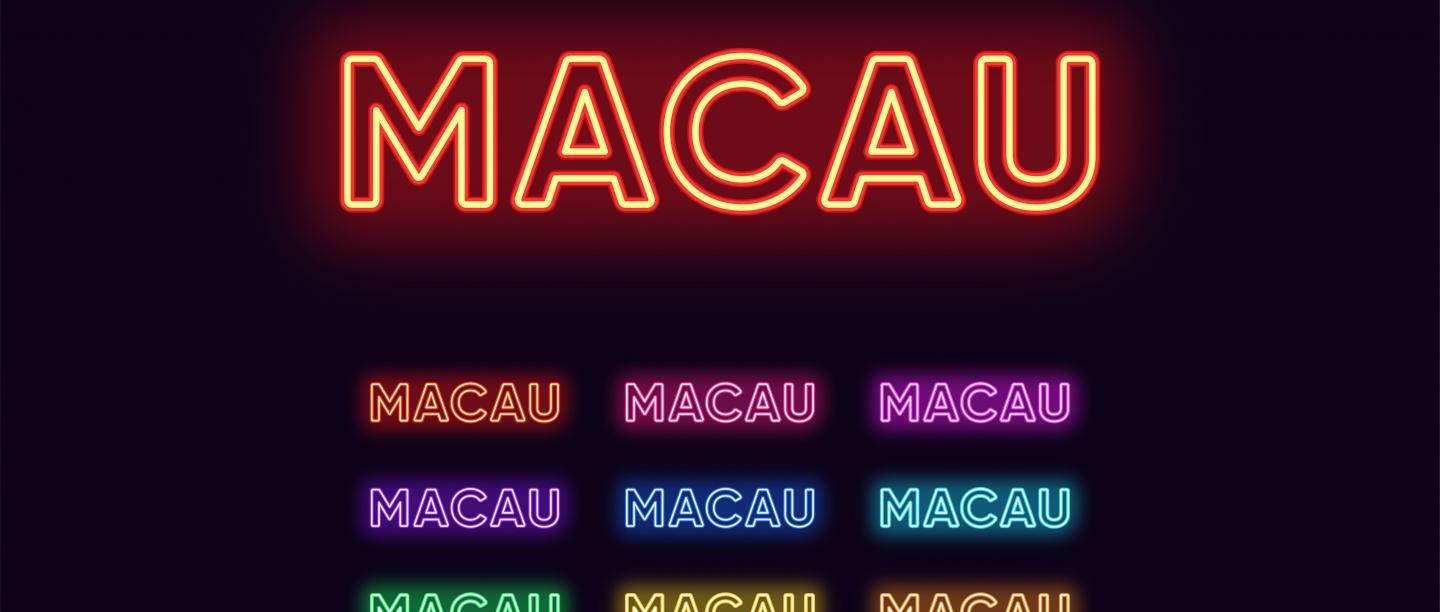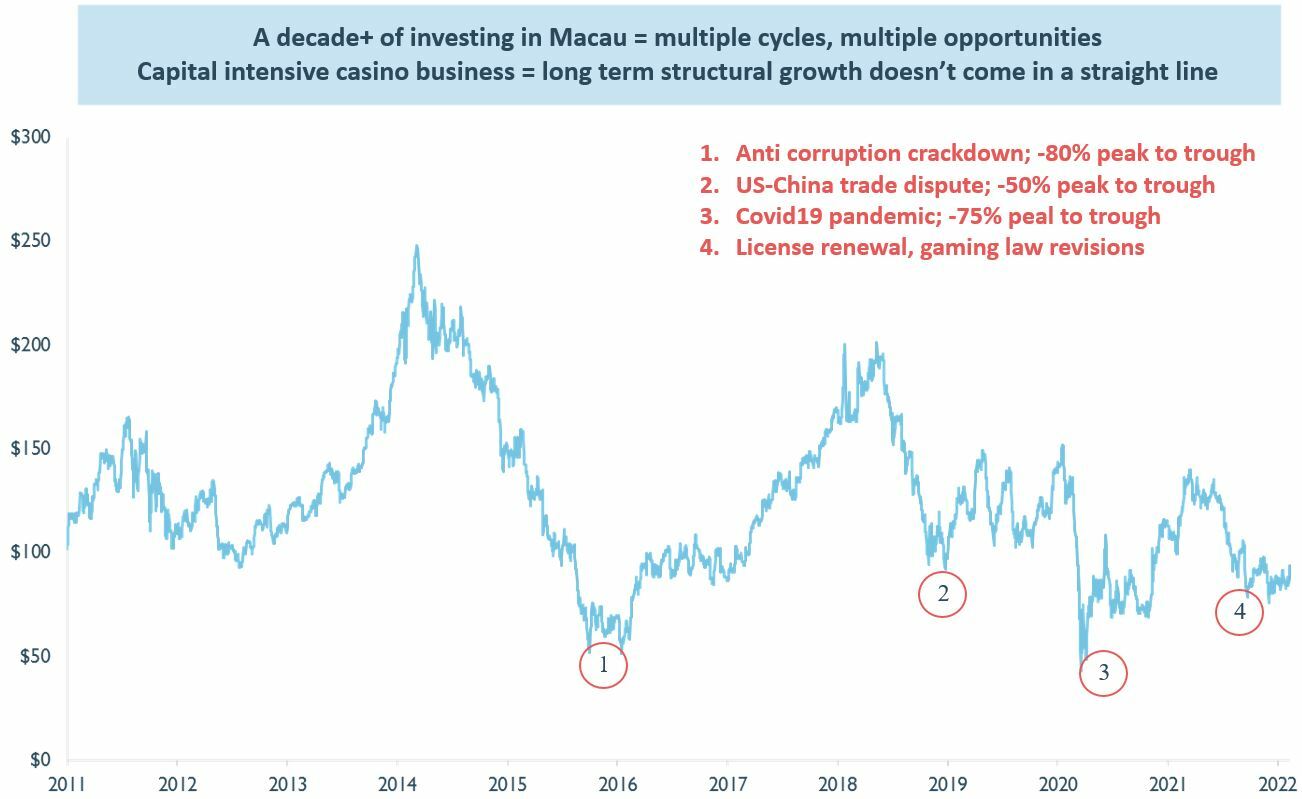'Betting on a recovery in Macau casinos' is one of five of PM Capital's current key investment themes
By Kevin Bertoli, Co-Portfolio Manager - Equities
Introduction
PM Capital’s investment in casino companies with Macau operations shows the benefits of capitalising on valuation anomalies that can emerge within cyclical industries.
Since 2009, we have invested in the Macau casino sector on several occasions, primarily through the ownership of US-operated companies with concessions to operate in the Macau market.
PM Capital’s largest casino position is in Wynn Resorts, a US-listed operator that owns and operates casinos in Las Vegas, Boston and Macau.
Other gaming positions in our portfolios include US-listed Las Vegas Sands, Sands China (70% owned by Las Vegas Sands) and Crown Resorts, which is currently the subject of a takeover by Blackstone, a US private equity firm.
Our positive view on Macau is based on five main factors. The first is a clearly defined industry landscape. The Macau Government has granted six casino operating concessions and provided set land allocations for casinos. That has strengthened the competitive position of a small group of operators there.
The second factor is China’s large addressable market. More than half of China’s population has entered the middle class, from an estimated 3% in 2000.1 China knows there is strong local demand for casinos and that Macau is the best place to contain and regulate it.
Improving accessibility to Macau is the third factor. Macau is 60 kilometres west of Hong Kong on China’s southwestern coast. An increase in hotel rooms and flights, and favourable visa policies to encourage tourism, will help Macau accommodate more tourists. In 2018, Macau had just under 40,000 hotel rooms; Las Vegas had almost 150,000 rooms.
The fourth factor is the presence of world-class casino operators in Macau. Wynn Resorts, Las Vegas Sands and MGM have long experience in the sector. Operators with Macau concessions are listed on US or Hong Kong exchanges.
The fifth is an attractive return on capital invested. Since the breaking of Macau’s 40-year gaming monopoly in 2006 with the opening of Las Vegas Sands’ Sands Macao property, there have been xx integrated resorts built by the six concession holders.
Our analysis has found that while returns have come down from the stratospheric xx% achieved by the Sands Macao property, most properties have a return on investment (ROI) of 15-20%, compared to a single-digit return for most Las Vegas casino operators. Wynn Resorts’ two properties, Wynn Macau and Wynn Palace, for example, have an ROI of over 20% per annum.
High volatility
Although Macau casinos have favourable growth characteristics, industry volatility has been high. That is to be expected of an emerging industry in a developing nation – and is a reason why PM Capital has taken a long-term view of Macau’s casino sector.
To recap, Macau was transferred from Portugal to the People’s Republic of China in 1999 and became a special administrative region. In 2002, the Macau Government ended the monopoly rights to all forms of gambling there and granted three (later to become six) licences to foreign and local companies.
Today, Macau is one of the world’s wealthiest places due largely to its casino industry. Covering 32 square kilometres, Macau has 41 casinos. It attracted almost 40 million visitors in 20192, many of whom came to gamble. Despite having fewer casinos than Las Vegas, Macau generates far more gaming revenue than the US casino city.3
However, as Chart 1 below shows, the performance of Wynn Resorts (and other Macau operators) has been volatile over the past decade due to regulatory uncertainty, geopolitical risk and COVID-19.
Chart1: Wynn Resorts
This chart also shows how cycles have formed within Macau’s long-term structural growth cycle – and the market’s intense reaction to bad news. By 2016, Wynn Resorts shares had fallen 80% peak-to-trough as the Chinese Government initiated an anti-corruption crackdown across China.
Casino operators linked to Macau recovered, only to be affected by negative sentiment from the US-China trade dispute. Wynn fell 50% from peak-to-trough in 2019.
When COVID-19 erupted in 2020, Wynn Resorts fell 75% from peak-to-trough as casinos worldwide were shuttered because of lockdowns, and as arrivals to Macau stalled.
At its COIVD-19 low, Wynn Resorts traded on a Price Earnings (PE) multiple of less than 5 times its normalised earnings, according to our analysis. Its valuation was bottom quartile.
Having meaningfully reduced our holdings, including the sale of our Wynn Macau and Las Vegas Sands positions in early 2018 after a 2-year rally, we took advantage of price weakness to re-establish positions in 2019 and 2020. We believed the market had overreacted to geopolitical risks stemming from the US-China trade dispute and the COVID-19 and regulatory uncertainty.
New risks emerge
The latest risk has been regulatory. In September 2021, the Chinese Government commenced a Gaming Law Review and licence-renewal process. The public-consultation process raised fears of increased government oversight of the Macau casino sector, dividend controls, a required increase in local ownership, and the appointment of Chinese government representatives to the boards of Macau casinos.
Having watched a regulatory crackdown in Chinese education and technology sectors, the market feared the worst for Macau casinos. Valuations tumbled. At one point, the market ascribed almost no value to the Macau operations of Wynn Resorts and Las Vegas Sands, even though they were prized assets in the world’s casino capital.
PM Capital has invested in casino companies for many years. We know the market has a history of overreacting to bad news in casino stocks overseas and in Australia.
We have also owned casino stocks closer to home. In 2020, PM Capital initiated a position in Crown Resorts, an Australian casino operator with world-class assets in Melbourne, Perth and Sydney. In our view, Crown shares had fallen too far amid the dual concerns of COVID-19 closures and fears it could lose its licences after money-laundering allegations, which were first examined by the Bergin Inquiry in New South Wales.
PM Capital initiated a position in Crown at under $9 a share. In January 2022, Blackstone proposed a scheme of arrangement for Crown at $13.10 per share, which Crown’s board recommended. At these levels, we viewed the valuation as being backed by Crown’s underlying property assets, with no value being ascribed to the operating licences. With very little debt on its balance sheet after the sale of apartments at Crown Sydney, we view the downside in Crown Resorts as well protected.
It did not surprise PM Capital that private equity pounced on Crown. Having invested in alternative asset managers for years, PM Capital knows that private equity firms look to acquire quality assets, such as casinos, when they are oversold. In Crown’s case, the quality of its property portfolio supported its valuation.
Ironically Blackstone’s proposal signals the end of PM Capital’s long association with the Crown assets. In 2004, we were a substantial shareholder in the listed Burswood Casino Trust (owner of the Burswood Casino in Perth) which was acquired by Crown.4
Outlook
PM Capital retains a positive view on Macau casino operators. The Chinese Government’s Gaming and Licence Renewal Update has confirmed our view that the market was too bearish on the potential for regulatory change in the sector.
In January 2022, the review said there would continue to be a maximum of six licences of up to 10 years each, with no increase in tax rates. There would be no dividend restrictions or requirements for government representatives to be appointed to boards. Local ownership (voting, not economic) will increase from 10% to 15% and be applied after licence tendering. The market reacted positively to this news.
This outcome aligned with our views of the Macau casino sector. PM Capital believes the sector is well regulated and that gaming has been critical to Macau’s growth over the past decade. We thought it was not in China’s interests to disrupt the status quo in Macau and that changing the licence structure would have been hard to implement.
Longer-term, Macau is vital in the development of a larger Chinese tourism industry, particularly in the Greater Bay tourism zone, which includes Macau and Hong Kong.
Another potential tailwind for Macau is the world’s emergence from the pandemic. China’s zero COVID-19 strategy means it has tougher restrictions than most nations, which disproportionately affects its casino operators (compared to those in the US). But as COVID-19 becomes endemic rather than pandemic, Macau’s recent increase in gaming tourism should gain momentum this year and next.
When COVID-19 struck, PM Capital believed the pandemic would not change the positive long-term outlook for Macau casino operators. Our casino holdings had the balance-sheet capacity to handle a prolonged industry shutdown due to COVID-19 (18 months or more). We expect Macau casino operators will emerge from COVID-19 with higher profit margins, having cut costs during the pandemic.
We believe the completion of the licence-renewal process could potentially act as another positive catalyst helping to re-rate Macau casino stocks, as it allows investors to refocus on the longer-term earnings power of these businesses.
Under the right conditions, our expectation is that Wynn Resorts will trade closer to its long term valuation - a PE closer to 20 times normalised earnings - suggesting potential upside remains.
| Back to our 5 current themes | Managed Funds | Contact Us | Subscribe to our insights |
Notes and References
1 ChinaPower, (2022), “How well-off is China’s Middle Class”.
2 TourismReview News. “Macau reported a 30.7% increase in visitor arrivals in 2021,” 7 February 2022.
3 Business Matters (2019), “Las Vegas V Macau: which is the capital of casino gambling”.
https://www.afr.com/companies/pbl-bid-for-burswood-wins-support-2004070…
4 The PM Capital's Enhanced Yield Fund was awarded the Money magazine Best of the Best 2020: Best Income Fund - High Yield and Credit
This Insight is issued by PM Capital Limited ABN 69 083 644 731 AFSL 230222 as responsible entity for the PM Capital Global Companies Fund (ARSN 092 434 618, the ‘Fund’). It contains summary information only to provide an insight into how we make our investment decisions. This information does not constitute advice or a recommendation, and is subject to change without notice. It does not take into account the objectives, financial situation or needs of any investor which should be considered before investing. Investors should consider the Target Market Determinations and the current Product Disclosure Statement (which are available from us), and obtain their own financial advice, prior to making an investment. The PDS explains how the Fund’s Net Asset Value is calculated. Past performance is not a reliable guide to future performance and the capital and income of any investment may go down as well as up.
See www.pmcapital.com.au/global-companies-fund/performance for standard reporting periods. The investment objective is not a forecast, and is only an indication of what the investment strategy aims to achieve over the medium to long term. Returns are calculated from exit price to exit price assuming the reinvestment of distributions for the period as stated and represent the combined income and capital return. The Index is MSCI World Net Total Return Index (AUD). See www.msci.com for further information.



